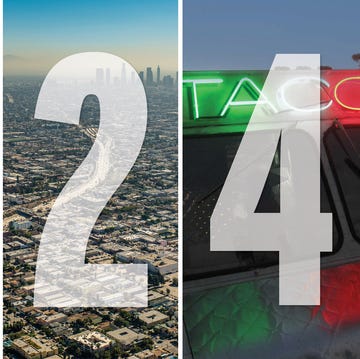Now in its fourth year, the California Book Club once again presented our ever-growing audience with the opportunity to connect with a dozen new award-winning authors and one of their titles that embodies a distinct West Coast voice and perspective. Throughout the month leading up to each author interview (usually held on the third Thursday of the month), Alta Journal published creative essays that examined themes in and conversations around the book from an unexpected angle. Below, you’ll find some of our favorite essays from this year, one for each month’s selection, and a link to watch the entire CBC interview with any (or all) of our 2024 class of authors. Want more? Make sure you’re a member of this free club and sign up for our newsletter here.
JANUARY: HOLY LAND, BY D.J. WALDIE
We’re partial to Anna E. Clark’s essay on the literary tradition of explaining California because, well, that’s what we love to do at Alta. Connecting the dots between Waldie’s work and that of writers like Joan Didion and Charles Bukowski, Clark helps us see Holy Land within the context of Golden State literature.
FEBRUARY: THE EVERY, BY DAVE EGGERS
Does it all really come down to data? Writer Chris Vognar explores how Eggers uses his surveillance-capitalism novel to critique the loss of necessary discursions that occurs when people seek quantification of every aspect of being human.
MARCH: THE OTHER AMERICANS, BY LAILA LALAMI
California Book Club host John Freeman considers the happenstance involved in the occurrences that delineate the lives of the characters in Lalami’s book. Freeman pens an essay in advance of every CBC interview he does, and reading his interpretations before he sits down to interview the author provides readers with a multilayered experience—exactly what we want to bring members of the club.
APRIL: THE GANGSTER OF LOVE, BY JESSICA HAGEDORN
Writer Sarah Stone shines light on the context of Hagedorn’s 1996 novel, The Gangster of Love. In this essay, Stone helps us develop a deeper understanding of the work through examples and historical background.
MAY: RIPRAP AND COLD MOUNTAIN POEMS AND THE PRACTICE OF THE WILD, BY GARY SNYDER
Tackling the big questions prompted by Snyder’s The Practice of the Wild, writer Daegan Miller’s essay looks at the language of wilderness. What does it mean to be wild? As the writer points out, Snyder has a particular talent for leading us there.
JUNE: SOLITO, BY JAVIER ZAMORA
Drawing on experiences from her own family, author Michelle Cruz Gonzales considers the personal impact of migration on family relationships.
JULY: DEAD IN LONG BEACH, CALIFORNIA, BY VENITA BLACKBURN
Writer Sarah Stone takes a look at the ways in which Blackburn understands more about human capabilities than her novel’s central character, a woman whose brother has taken his own life.
AUGUST: UNDER THE FEET OF JESUS, BY HELEN MARÍA VIRAMONTES
As Viramontes’s book depicts long-standing injustices in California farmwork, Alta’s Elizabeth Casillas interviewed three workers involved with Líderes Campesinas, a nonprofit network of advocates dedicated to improving the lives of female farmworkers throughout the state.
SEPTEMBER: COLORED TELEVISION, BY DANZY SENNA
California Book Club editor Anita Felicelli examines how Senna plays with questions of commodification, property, and ownership in her hilarious novel.
OCTOBER: THIS BOY’S LIFE, BY TOBIAS WOLFF
A consistent theme throughout any California Book Club pick is a sense of place. Writer Charles Finch pens this moving essay focused on Wolff’s time in the West as an abused child in search of his own identity.
NOVEMBER: VIOLENT SPRING, BY GARY PHILLIPS
South Central Los Angeles is as much a main character in Phillips’s crime stories as anyone else. In this thoughtful article by native Angeleno Mike Sonksen, the writer explains how Phillips’s ability to authentically present this famed neighborhood is a big reason why his work is so effective.
DECEMBER: GOODBYE, VITAMIN, BY RACHEL KHONG
In his deep examination of Khong’s debut novel, CBC host John Freeman ruminates on the curious ways in which humans measure time.•












